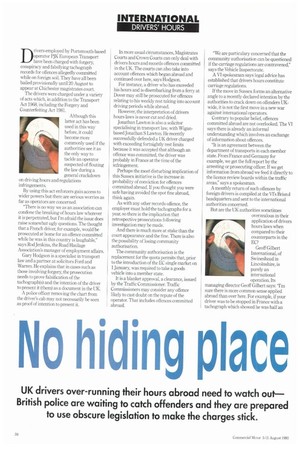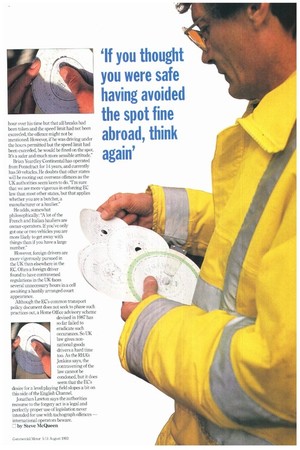INTERNATIONAL
Page 36

Page 37

If you've noticed an error in this article please click here to report it so we can fix it.
DRIVERS' HOURS
Drivers employed by Portsmouth-based operator PJK European Transport have been charged with forgery, conspiracy and falsifying tachograph records for offences allegedly committed while on foreign soil. They have all been bailed provisionally until 20 August to appear at Chichester magistrates court.
The drivers were charged under a variety of acts which, in addition to the Transport Act 1968, including the Forgery and Counterfeiting Act 1981.
Although this latter act has been used in this way before, it could become more commonly used if the authorities see it as the only way to tackle an operator suspected of flouting the law during a general crackdown on driving hours and regulations infringements.
By using this act enforcers gain access to wider powers but there are serious worries as far as operators are concerned.
"There is no way we as an association can condone the breaking of hours law wherever it is perpetrated, but I'm afraid the issue does raise somewhat ugly questions. The thought that a French driver, for example, would be prosecuted at home for an offence committed while he was in this country is laughable," says Rod Jenkins, the Road Haulage Association's manager of employment affairs.
Gary Hodgson is a. specialist in transport law and a partner at solicitors Ford and Warren. He explains that in cases such as those involving forgery, the prosecution needs to prove falsification of the tachograph(s) and the intention of the driver to present it (them) as a document in the UK.
A police officer removing the chart from the driver's cab may not necessarily be seen as proof of intention to present it. In more usual circumstances, Magistrates Courts and Crown Courts can only deal with drivers hours and records offences committed in the UK. The courts can also take into account offences which began abroad and continued over here, says Hodgson.
For instance, a driver who has exceeded his hours and is disembarking from a ferry at Dover may still be prosecuted for offences relating to his weekly rest taking into account driving periods while abroad.
However, the interpretation of drivers hours laws is never cut and dried.
Jonathan Lawton is also a solicitor specialising in transport law, with Wiganbased Jonathan S Lawton. He recently successfully defended a UK driver charged with exceeding fortnightly rest limits because it was accepted that although an offence was committed, the driver was probably in France at the time of the infringement.
Perhaps the most disturbing implication of this Sussex initiative is the increase in probability of conviction for offences committed abroad. If you thought you were safe having avoided the spot fine abroad, think again.
As with any other records offence, the employer must hold the tachographs for a year, so there is the implication that retrospective prosecutions following investigation may be made.
And there is much more at stake than the court appearance and the fine. There is also the possibility of losing community authorisation.
The community authorisation is the replacement for the quota permits that, prior to the introduction of the EC single market on 1 January, was required to take a goods vehicle into a member state.
It is a blanket approval, a clearance, issued by the Traffic Commissioner. Traffic Commissioners may consider any offence likely to cast doubt on the repute of the operator. That includes offences committed abroad. "We are particulary concerned that the community authorisation can be questioned if the carriage regulations are contravened," says the Vehicle Inspectorate.
A VI spokesman says legal advice has established that drivers hours constitute carriage regulations.
If the move in Sussex forms an alternative angle to a recently declared intention by the authorities to crack down on offenders UKwide, it is not the first move in a new war against international operators.
Contrary to popular belief, offences committed abroad are not overlooked. The VI says there is already an informal understanding which involves an exchange of information about offences.
"It is an agreement between the department of transports in each member state. From France and Germany for example, we get the full report by the arresting or prosecuting officer. If we get information from abroad we feed it directly to the licence review boards within the traffic areas," says a spokesman.
A monthly return of such offences by foreign drivers is compiled at the VI's Bristol headquarters and sent to the international authorities concerned.
But are the UK authorities sometimes overzealous in their application of drivers hours laws when compared to their counterparts in the EC?
Geoff Gilbert International, of Swineshead in Lincolnshire, is purely an international operation. Its managing director Geoff Gilbert says: "I'm sure there is more common sense applied abroad than over here. For example, if your driver was to be stopped in France with a tachograph which showed he was half an hour over his time but that all breaks had been taken and the speed limit had not been exceeded, the offence might not be mentioned. However, if he was driving under the hours permitted but the speed limit had been exceeded, he would be fined on the spot. It's a safer and much more sensible attitude."
Brian Yeardley Continental has operated from Pontefract for 14 years, and currently has 50 vehicles. He doubts that other states will be rooting out overseas offences as the UK authorities seem keen to do. "I'm sure that we are more vigorous in enforcing EC law than most other states, but that applies whether you are a butcher, a manufacturer or a haulier."
He adds, somewhat philosophically: "A lot of the French and Italian hauliers are owner-operators. If you've only got one or two vehicles you are more likely to get away with things than if you have a large number."
However, foreign drivers are more vigorously pursued in the UK than elsewhere in the EC. Often a foreign driver found to have contravened regulations in the UK faces several unnecessary hours in a cell awaiting a hastily arranged court appearance.
Although the EC's common transport policy document does not seek to phase such practices out, a Home Office advisory scheme devised in 1987 has SO far failed to eradicate such occurances. So UK law gives nonnational goods drivers a hard time too. As the RHNs Jenkins says, the contravening of the law cannot be condoned, but it does seem that the EC's desire for a level playing field slopes a bit on this side of the English Channel.
Jonathan Lawton says the authorities recourse to the forgery act is a legal and perfectly proper use of legislation never intended for use with tachograph offences — international operators beware.
El by Steve McQueen












































































